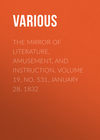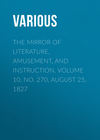Kitobni o'qish: «Chambers's Journal of Popular Literature, Science, and Art, No. 681»
A WASTED EXISTENCE
In every account of the French Revolution, there crop up names of actors in that terrible drama, not to be forgotten. The very vileness of these individuals has rendered their names imperishable. Execrated by successive generations, it would never occur to us that a time would come when, by a distortion of principle, literature would try to gloss over the evil deeds of these infamous personages, and hold them up to general admiration and pity. It would be imagined that Robespierre, Marat, St Just, Danton, Camille Desmoulins, Hebert, Couthon, and a number of others, were too bad – too persistently wicked – to evoke sentiments of compassion. Time, however, brings about unexpected changes. For anything we can tell, some plodding enthusiast may be ransacking archives, and gathering traditions to represent Robespierre as a noble-minded hero, whose character has been altogether misunderstood. Marat, too, may possibly soon be spoken of with gentle regret – as what a worthy young man he was when studying medicine at Edinburgh, and living in modest lodgings in the College Wynd, and so on; making him out to be a prodigy of excellence. As a commencement to this new and undesirable literature, comes a biography of Camille Desmoulins, by a French writer, Jules Claretie, purporting to be founded on hitherto unpublished documents, and which appears before us as an English translation. Not a paltry-looking book is it by any means, but a handsomely printed octavo, of nearly five hundred pages, embellished with a portrait of the hero Camille. After that nothing will surprise us.
Unless for a hope of drawing some useful moral for the benefit of young and ardent spirits, we should not have ventured on any notice of this extraordinary production. What the moral is, will appear as we go along. It may be worth while in the first place to say that Claretie, the writer of the book, almost worships his hero. He sets out by describing him as the 'gamin of genius, whom Paris attracted, seduced, and kept for ever;' and then, to let us know the fullest particulars of the wonderful gamin, he makes a pilgrimage to the small town of Guise, in Picardy, where Camille was born, 2d March 1760. The antique little town is gone through from end to end; and the house in which Camille first drew breath, and spent his early years, situated in the street of the Grand Pont, in front of the Place d'Armes, is minutely described. Claretie was shocked to find that the inhabitants of the town had no remembrance of his hero. 'They have forgotten their unfortunate townsman, the generous fool, the madcap of genius, who gave his life to the Republic – they have forgotten, after having misunderstood, and perhaps calumniated him.'
Camille's father occupied a good position. Skilled in the law, he was lieutenant-general of the bailiwick of Guise, and a grave and industrious man, highly esteemed by all within his jurisdiction. His wife had brought him a small fortune, which partly paid for the education of his five children, of whom Camille was the eldest. As this eldest boy grew up, great hopes were entertained of his intelligence and general liveliness. He should receive a good college education, and be brought up a man of law. Who knows but he might one day become a member of the Parliament of Paris? With some financial scheming, and the presentation of a bursary, Camille was entered a student at the college of Louis-le-Grand. Here, studying with avidity, and quick in apprehension, he attained a singular proficiency in a knowledge of Greek and Roman classics. Unfortunately, the more deeply he became acquainted with ancient authors, the more was his enthusiastic temperament stimulated to uphold in its wildest form the cause of political liberty. Nothing restrained his impassioned notions. Poring over the Old Testament, he discovered, as he thought, in a passage in Ezekiel that the Revolution was predicted word for word. Then, in his perturbed imaginings he began to write poetry, full of frantic allusions to the harangues of Demosthenes and Cicero. Completing his education, he became a licentiate of law, and in 1785 was sworn in as an advocate of the Parliament of Paris. His choice of a profession was somewhat of a mistake; for in the opening of a speech he usually stammered awkwardly, by involuntarily repeating the words hon, hon; wherefore, in fun, he acquired the name Monsieur Hon. It was only at the outset of an oration that he stumbled on hon, hon; for when once fairly set agoing he spoke fluently and with precision. Yet, the hon, hon was against him as a pleader, and he did not rise to distinction at the bar. The truth is, he was more ready as a writer than a speaker; and at the dawn of the Revolution he is found to be one of those pamphleteers who inconsiderately helped to stir up the wildest passions of the mob. To his relations in the antiquated town in Picardy he offered a painful spectacle. It was felt that his education and his brilliant talents had only qualified him to be a reckless demagogue. Sad down-come to the hopes of old Desmoulins, who had not the slightest desire to turn the world upside down.
Camille's infatuation was that of thousands, whose brains had been deranged not less by the teaching of so-called philosophers, than by the scandalous condition of public affairs. From causes familiar to all who have read the history of France, abuses of every sort had attained dimensions which nothing short of the most earnest and patient consideration could peaceably redress. Patient consideration, however, was the last thing thought of. The unfortunate Louis XVI. was unable to allay the general effervescence; and his ministers, though well-meaning in their way, were unfit to stem the political ferment. In July 1789, on the exile of Necker, the popular wrath was great. The great court-yard of the Palais-Royal, which we now see a picture of tranquillity with its nurses and children, was crowded with vehement orators. The most fiery of the whole is Camille Desmoulins, who jumps upon a table, and for the instant overcoming his stammer, addresses and adds fury to the surging multitude. The spark of armed revolt was struck. A day or two afterwards (July 14), the Bastille was assaulted and taken. In the midst of the hideous saturnalia, Camille is seen with a drawn sword in his hand, joining in the popular triumph.
From this time Camille is one of the leaders of the Revolution, by speaking at the clubs and using his pen freely. His work La France Libre (France Free) helped materially to give him notoriety. The book, however, dealt too much with liberty in the abstract. He deemed it necessary to hint at the advantages of doing summary justice on suspected individuals. Here was a scholar and a gentleman so carried off his feet by political frenzy as to write ironically of assassination. His production, animated with a terrible demoniac fury, was entitled Discours de la Lanterne aux Parisiens– in plain English, the iron of the street lamps is invoked as a convenient gallows on which to perform the atrocities of 'Lynch-law.' From this extraordinary and disreputable production, Camille became known as the 'procureur-général de la lanterne;' a designation which he did not dislike. Will it be credited? Claretie, who tells all this minutely, expresses no horror at the revelation. Speaking of the work, he says: 'There was never anything more eloquent. Its wit, even when it seems ill employed in deadly personalities, dazzles us.'
Conferring a feverish popularity on Camille, which was satisfying to his vanity, these productions were, it appears, of little pecuniary avail. He was now thirty years of age, with barely means of subsistence; such was his extremity, that he was driven to ask doles of money from his father, which could very ill be spared. From this state of depression his fortunes rose by the exercise of his pen as a journalist. His periodical was styled the Révolutions de France et de Brabant. It was successful, but only by the vileness of its lampoons and libels on private character, which brought him frequently into trouble. In his wild indiscretion, he even cut libellous jokes on M. Sanson, the public executioner, who, not inclining to submit to his impertinence, raised an action of damages to the extent of three thousand livres. Considering the way in which public affairs were drifting, an attack on Sanson was very much like an act of madness. The guillotine was soon to be in full swing.
Towards the end of 1790, Camille passed through what may be called the romance of his existence. He formed an ardent attachment to Lucille Duplessis, a young lady of a good family, handsome, beautiful, of gentle temperament, and whom he called 'an adorable little blonde.' M. Duplessis, the father, offered some opposition to the proposed match; but in time he assented to what seemed the inevitable, and accepting Camille as a son-in-law, gave him a good fortune with his daughter. The marriage took place December 29, 1790, and we observe that among Camille's friends as witnesses are inscribed the names of Petion and Robespierre.
While still pouring out invectives in his journal, there occurred a fresh theme for vituperation. Alarmed for his personal safety, the poor king attempted to fly with his family, and was arrested, and brought back (June 1791). Roused at the idea of the king's desertion of his post, Camille's fury knew no bounds. He degraded his pen by writing of the 'male and female Capets,' and in his fervour headed a deputation to the municipality informing them of the project of deposing Louis XVI. Shortly afterwards, under some apprehension of rough usage, he dropped the publication of his journal, and for a time he resumed his occupation of advocate at the tribunals. In these vicissitudes he clung in a friendly spirit to Danton, and Danton liked him as an associate. They lived in different floors of the same building, in the Cour de Commerce, and betwixt their respective wives there was a kindly intercourse, the account given of which comes soothingly amidst details of public perturbation. Camille's son, Horace, was born July 6, 1792, 'the little Horace whom Robespierre danced so often on his knees' – a fine point this for any biographer of Robespierre!
Soon came the terrible convulsion of the 10th August 1792, when the Tuileries were sacked by a savage mob, and the royal family were forced to seek refuge in the National Assembly. What part Camille took in this brutal affair is not mentioned. We only know that he was somehow engaged in the disturbance, and, to the consternation of his wife Lucille, came home with a gun in his hand. The monarchy, at which he constantly railed, was now substantially at an end. A universal terrorism was let loose. Searching visits to private houses having filled the prisons with suspected aristocrats, it was resolved to massacre them en masse. The municipality taking in hand this atrocity, hired a band of three hundred assassins, who began the work of destruction on the 2d September. The massacre lasted five days, during which eight thousand individuals, convicted of no crime, were put to death with barbarous cruelty. Claretie indignantly denies that Camille had any hand in this iniquity, and throws the blame on Danton, who was now Minister of Justice and wished to strike terror into the royalists. An authority which we consider to be as trustworthy as Claretie, says distinctly that Camille, who was appointed secretary to Danton, 'organised with him the massacres in the prisons.' At anyrate, Camille was the confidant and associate of Danton, with whose designs he could scarcely fail to be acquainted.
Camille was now appointed a deputy to the Convention by the city of Paris, and as such he was placed in close connection with the leaders of the Revolution. We have not space to follow him in this new line of duty. As a Dantonist, he roundly abused the Girondists. To his eternal disgrace, he voted for the king's death, and had not even the good taste to refrain from facetiousness on the occasion. Deeply and remorsefully did he pay for his obsequiousness to the vilest of mankind. Already there was a Nemesis on his track. Batch after batch of unhappy individuals were condemned by the Revolutionary Tribunal, not only in Paris but all over France. Camille began to entertain the notion that things had gone too far. His conscience was roused, and roused in a remarkable manner. Walking out one evening, the rays of the setting sun shining brilliantly, seemed to transform the waters of the Seine into a river of blood. To his poetical fancy the phenomenon was accepted as an appeal to mercy, and awakened him to a lively sense of the horrors produced by the revolutionary mania. We are led to understand that from this time he began to agitate for moderate measures. The change of views, though morally commendable, was fatal as regarded his own safety. Camille, who at first was thought to be recklessly extreme in his views, was now reckoned among the moderates, and was pointed at with the finger of scorn. He was chargeable with the grave offence of dining with aristocrats. Repudiated by the Cordeliers, of which club he had once been a shining light, he was in a sense a political outlaw. Such was the reward of his frantic extravagances. In his mortification he commenced a paper in numbers, the Vieux Cordelier (Old Cordelier). It was admirable as a brilliant effort of genius, but was of no more avail than if it had been addressed to a menagerie of wild beasts. The Old Cordelier advocated the institution of a Committee of Clemency to stay the Reign of Terror. The proposals for mercy were denounced at a meeting of the Jacobin Club, when Robespierre suggested that the numbers of the Old Cordelier then published should be burned. 'Burning is not answering,' said Camille. 'Well, your writings shall be answered,' replied Robespierre. The answer was to be of a sharper nature than was implied by the words. Robespierre resolved to get rid of Camille, as any further connection with him would imperil his own safety.
From the fragmentary documents which Claretie has strung together, it is learned that in the beginning of 1794 Camille was beset by fatal presentiments. 'He was weary; he felt that all was lost; and that he had brought about not his own destruction only, but that of his family.' Bitter consideration! We wonder – for Claretie does not tell us – whether Camille at this saddening period ever had a clear idea of the error he had committed? Did he now see that while his theories were possibly unchallengeable in the abstract, they had all along been unsuitable for practical application in France, where the bulk of the people were illiterate, and without any experience of the obligations incidental to constitutional government? Likely enough, like others about him, his head was too much in the clouds to see things in this light. The 'generous fool,' as Claretie calls him, he had, ever since commencing as tribune of the people, been contributing to widespread ruin and his own cruel death. Possibly, he reckoned that the friendship of Robespierre, who was now the arbiter of fate, would save him from the guillotine. Vain hope, if it ever existed. Robespierre, the 'Incorruptible,' knew nothing of friendship, in pursuit of his grand idea of cutting off three hundred thousand heads; and the heads of Camille Desmoulins and his wife Lucille would help as well as others to make out the tale. Besides, Camille's defection towards moderatism was not to be endured.
It was not pleasant for Camille to find that he was at the mercy of a man possessed with notions so very uncompromising; but he had brought this awkward position on himself, and felt he must take the consequences. Robespierre had no difficulty in finding a plea to ruin Camille. Passages of the Old Cordelier were quoted to his disadvantage. Camille foresaw his condemnation, and while anticipating his arrest, he received a letter from his father intimating the death of his mother. 'Camille's grief was profound; his eyes were still red with tears when the patrol charged with the duty of arresting him and Danton, took possession of the Cour de Commerce. The first words that Camille uttered when he heard the dull sound of the butt-ends of the muskets on the pavement were: "They have come to arrest me." Lucille listened to him, and looked at him bewildered. She felt as if she should go mad. Camille was calmer than might have been expected. He dressed himself, embraced his child, took from his library Young's Night Thoughts, and Hervey's Meditations among the Tombs, and then pressing to his heart his weeping wife, whom he adored, their lips met for the last time in an agonising kiss made bitter by burning tears.'
Camille and Danton were carried off to the prison of the Luxembourg. Friends endeavoured to interpose in Camille's favour. Lucille traversed Paris trying to reach Robespierre's ear, that she might move him to pity. All in vain. There was a trial, but it was little better than a sham. Danton, Camille Desmoulins, Lacroix, Herault de Sechelles, Fabre d'Eglantine, Westerman, and some others, fifteen in all, were condemned. It was done! The Dantonists were to die. For the short space they were in prison previous to execution, Camille crouched down and wept over his wasted existence, and of what his young and bereaved wife might have to endure on his account. He had committed a double crime. By his folly two existences were blighted. And it was agonising to think of being brought to a violent death at thirty-four years of age, when full of life and vigour – hard to be sent to the scaffold by a parcel of ruffians, for whom he had paved the way to power by his writings, and who were glad to get rid of him, as being no longer useful in their selfish designs. These were crushing thoughts for Camille, at this terrible moment. Danton took things more philosophically. He, too, had to leave a young wife, but besides being less remorseful, he was of a manlier nature, and he stood firm at the approach of death. When the executioner arrived at the prison with his assistants to perform the toilet of the condemned, Camille struggled unmanfully, and it was necessary to tie him to his seat while the collar of his shirt and his hair were cut. He asked Danton to place between his bound hands a locket containing Lucille's hair, which he had hitherto worn next his heart. Danton complied; then gave himself up in his turn to the scissors and cords of the executioner.
















![Birds and Nature, Vol. 12 No. 2 [July 1902]](https://cdn.litres.ru/pub/c/cover_100/25569223.jpg)


